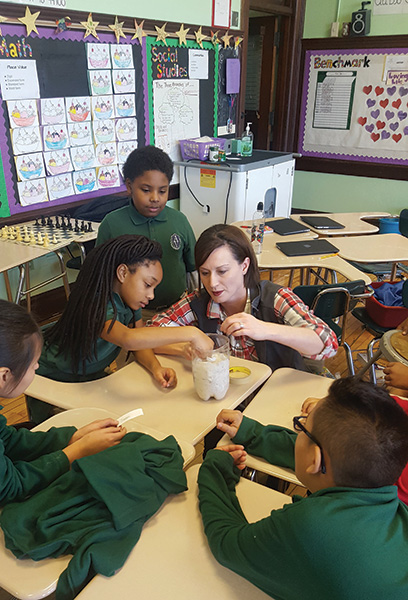Ripple Effect

Former FFA members Kellie Bray and Kristie Bray-Larson tell you how FFA continues to impact their lives.
Whether in Washington, D.C., or Kansas City, Missouri, the ripple effects of Kellie Bray and Kristie Bray-Larson’s time in the blue jackets are still making an impact today. Bray and Larson, twin sisters from Cameron, Missouri, said their years in FFA have greatly influenced their professional careers.
Growing up on a row crop and beef cattle farm, Bray and Larson have always had a passion for agriculture. FFA allowed them to pair that passion with personal skills gained through countless experiences and opportunities throughout the organization.
Larson served in leadership roles and on committees in their chapter. She also served as chapter secretary when they were seniors. Bray was the chapter president their senior year and decided to continue her leadership roles at the state and national levels. She served as Missouri State FFA Secretary and worked for the National FFA Organization as a member of the Washington Leadership Conference staff in college.
While the pair moved throughout their FFA careers side-by-side, they say their best experiences came from paving their own paths and focusing on self-discovery.
“Official Dress doesn’t help you distinguish yourself when you have an identical twin,” Bray says. “We already looked alike and then we had to dress alike too when we went to chapter events or competitions. That sometimes made it hard for people to learn the differences between us, but it also gave us an opportunity to really think about how we were alike and also how we were different in what skills, abilities or interests we brought. I don’t envy the people who tried to tell us apart those days. It was tough.”
Learning how to embrace the title of cheerleader was another favorite experience, Larson says.
“We looked at all of the high school sports and organizations we were involved in, and we decided to focus on what best fit each of our individual interests,” she explains. “Instead of competing against each other for offices or leadership roles, I took on leadership in our high school class and she led our FFA chapter and eventually ran for state office. It was much more fun to cheer for her than to compete against her all the time.”
Looking back, Larson and Bray both realize their time in FFA greatly impacted their choices of study and current careers.
“We would not have studied agricultural education at Mizzou had it not been for our time in FFA and the encouragement from our advisors,” Bray says. “All of the connections we made during FFA have carried on through our personal lives and professional careers.”
Larson is the director of education for the American Royal Association in Kansas City, Missouri. She oversees the American Royal’s agricultural education programs—both onsite and in the classroom—as well as managing the scholarship program and being the museum curator. FFA knowledge has served her well as the director of education.
“Learning about the history and traditions of FFA, many of which coincide with the American Royal, have impacted me in this role,” she says.
Across the country, Bray is the chief of staff for CropLife America in Washington, D.C., the national trade association that represents makers, manufacturers and distributors of pesticide products for all types of agriculture. She has carried relationships made through FFA into this career.
“I interact daily with people in Washington, D.C., and around the country who are former FFA members, many of whom I knew when I was an active member,” she explains. “It creates an immediate connection with another person, and it’s fun to recount ‘old’ stories.”
Bray is also a member of the group that chartered the Washington, D.C., FFA Alumni Chapter.
“It’s been a lot of fun to connect with people of all ages who are FFA alumni now in Washington, D.C.,” she says.
The tangible skills gained through FFA have also continually impacted them. From public speaking and organizational leadership to parliamentary procedure and proper self-presentation learned through Official Dress, the two agree they still use these skills and lessons learned daily.
Reflecting on their time in blue jackets, both Larson and Bray agree on the pride they have in the organization and everything it instilled in them.
“Through the classroom work, especially in the shop, I learned I could do things I never thought I could, like welding or woodworking,” Bray says. “I remember those experiences now when I wonder whether or not I can accomplish something new or different. And it makes for interesting conversation when someone learns I can weld.”
“Tradition, history, ritual and community are all words that come to mind,” Larson adds. “I have so much respect for what the blue corduroy jacket stands for. I valued being part of a national organization that is dedicated to the future of agriculture. I also truly appreciate how Supervised Agricultural Experience projects teach members about the value of hard work and responsibility. All of those characteristics will help them be successful members of society, regardless of their future career.”
—By Brandelyn Martin for Missouri FFA Today




